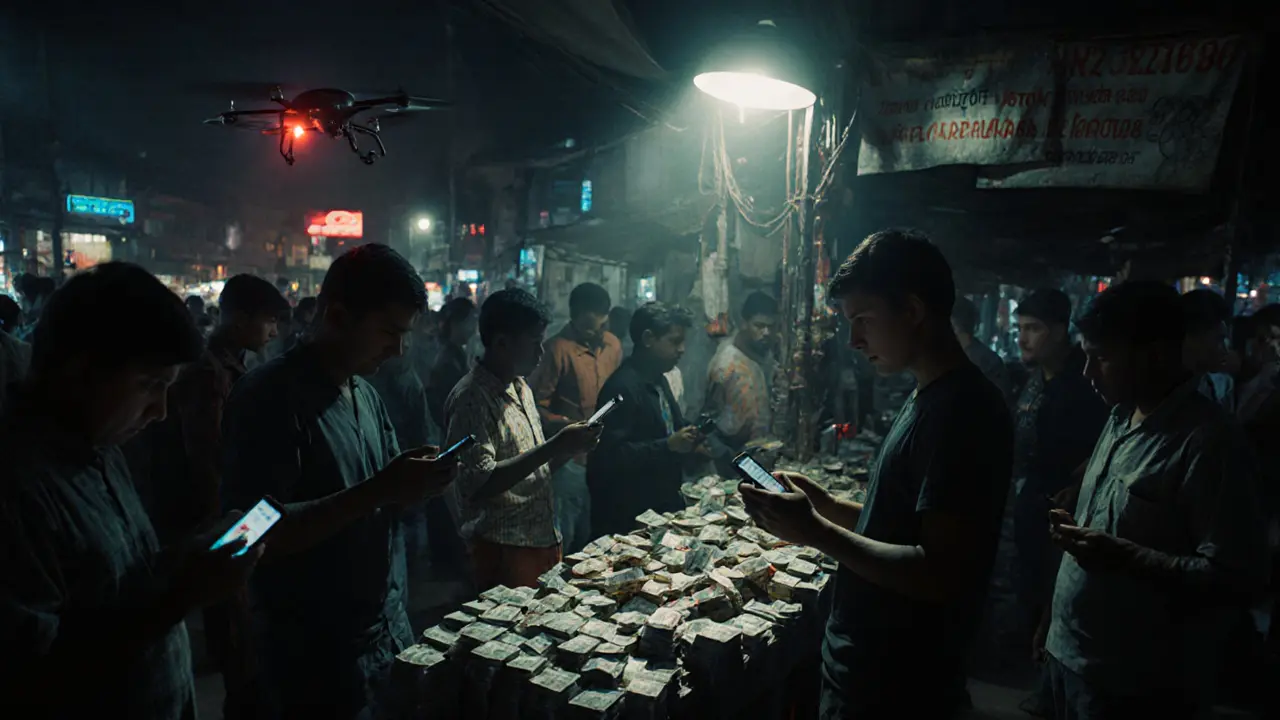Where Crypto Is Still Illegal - And Who’s Making It Hard to Use
If you live in one of these countries, owning Bitcoin isn’t just risky - it’s against the law. While much of the world is building crypto-friendly regulations, a handful of nations are doubling down on bans, taxes, and banking blocks to stop people from using digital money. These aren’t minor rules. They’re full-on criminalizations with real jail time, asset seizures, and financial blackouts.
It’s not about fear of technology. It’s about control. Governments in these places see cryptocurrency as a threat to their power - to their ability to track every dollar, to stop money from leaving the country, and to keep people dependent on state-run banks. The result? Millions of people are forced into the shadows just to hold or trade crypto.
China: The World’s Strictest Crypto Ban
China didn’t just restrict crypto - it erased it. In September 2021, the government made every form of cryptocurrency activity illegal: trading, mining, even running a crypto exchange. No exceptions. No loopholes. Banks can’t touch it. Payment apps can’t process it. And if you’re caught mining Bitcoin in your basement, you could face fines, equipment confiscation, or worse.
The government’s reason? Protecting the financial system and pushing its own digital currency, the digital yuan. But the ban didn’t kill crypto - it just pushed it underground. People still trade using peer-to-peer apps, VPNs, and offshore exchanges. The difference? Now it’s all illegal. And enforcement is getting tighter. Chinese authorities monitor internet traffic, track wallet addresses linked to local IDs, and raid homes suspected of mining.
For Chinese citizens, crypto isn’t a choice anymore - it’s a gamble. And the odds are stacked against you.
Bangladesh: No Crypto, No Matter What
In Bangladesh, even holding Bitcoin is illegal. The central bank, Bangladesh Bank, declared all cryptocurrency transactions a violation of the country’s Money Laundering Prevention Act. That means buying, selling, sending, or receiving crypto can land you in court. There’s no gray area. No tax system to comply with. Just a flat-out ban.
Despite having one of the fastest-growing mobile payment markets in Asia, Bangladesh refuses to let crypto in. The government fears capital flight and unregulated money flows. But the ban hasn’t stopped demand. Underground P2P networks thrive, with traders using WhatsApp, Telegram, and cash meetups to swap crypto for taka. Risky? Absolutely. But for many, it’s the only way to send money abroad or protect savings from inflation.
Authorities have arrested traders and shut down local exchanges. But enforcement is uneven. In rural areas, crypto moves quietly - and often unnoticed.
Algeria: Holding Crypto Is a Crime
Algeria doesn’t just ban crypto trading - it bans owning it. The country’s financial code makes it illegal to hold, transfer, or use any digital asset. This isn’t just about banks refusing to process transactions. It’s about criminalizing possession. If you have Bitcoin in your wallet, even if you never traded it, you’re breaking the law.
The government’s stance is simple: crypto threatens the Algerian dinar and the state’s control over financial flows. With a struggling economy and high youth unemployment, officials worry people will turn to crypto instead of the banking system. So they made it a crime.
Like in China and Bangladesh, people still find ways around it. Some use foreign exchanges with fake IDs. Others trade via local crypto groups that meet in person. But the risk is real. Algerian customs officials have seized phones and laptops during border checks, looking for crypto wallets. The punishment? Fines, confiscation, and possible imprisonment.

Bolivia: Crypto Is Officially Forbidden
Bolivia’s Central Bank issued a decree in 2014 that made crypto illegal - and it hasn’t changed since. The government says crypto enables fraud, money laundering, and undermines the national currency. But the real issue? Bolivia’s economy is fragile. The state wants to control every peso that moves.
Any transaction involving Bitcoin, Ethereum, or any other digital asset is considered void. Banks can’t process it. Merchants can’t accept it. And if you’re caught using crypto, you could be charged with financial crimes.
Despite this, crypto use hasn’t disappeared. Bolivians in border towns trade with Paraguay and Brazil using crypto. Some use it to send remittances home. But it’s all done in secret. There’s no official data, no tax reports, no legal protection. Just silence - and risk.
India: The Tax Trap That Stops Adoption
India didn’t ban crypto. But it made it so expensive to use, most people can’t afford it. In 2022, the government slapped a 30% tax on all crypto profits - no deductions, no losses allowed. On top of that, every single transaction - even sending Bitcoin to a friend - triggers a 1% tax deducted at source (TDS).
That means if you buy $1,000 worth of Ethereum and sell it for $1,500, you owe $150 in taxes. But if you send $200 to your cousin to pay for rent? Another $2 gone. If you trade daily? You’re paying hundreds in taxes just to move money around.
The Reserve Bank of India once blocked banks from serving crypto businesses. That ban was lifted in 2020, but the tax system remains a wall. Many traders now avoid reporting altogether. Others quit. The result? Legitimate users are punished. The black market thrives. And the government collects billions - but drives innovation out of the country.
Nigeria: Banking Blockade, Not a Ban
Nigeria has one of the biggest crypto markets in Africa - and one of the most aggressive banking bans. In 2021, the Central Bank ordered all financial institutions to stop serving crypto exchanges and users. No accounts. No transfers. No processing.
But here’s the twist: owning crypto is still legal. You just can’t use a bank to do it. So Nigerians turned to P2P platforms like Paxful and LocalBitcoins. They meet in person. They pay in cash. They use mobile money apps to swap naira for Bitcoin.
It’s messy. It’s risky. But it works. Over 30 million Nigerians use crypto. The ban didn’t stop adoption - it made it more dangerous. People get scammed. They get robbed. They lose money because there’s no legal recourse. But for many, crypto is the only way to save money or send cash overseas when the naira keeps falling.
Afghanistan: When the Taliban Banned Crypto
In August 2022, the Taliban government declared all cryptocurrency trading illegal. No exceptions. No warnings. Just a blanket ban.
The reasoning? Crypto could fund opposition groups. It could bypass sanctions. It could undermine the Taliban’s control over the economy. With the country’s banking system in ruins and foreign aid cut off, crypto offered a lifeline - and the Taliban shut it down.
Now, Afghans who used crypto to receive remittances from family abroad are cut off. Those who traded to survive now face arrest. Some have gone silent. Others use hidden wallets and offline transactions. But with no internet access in many areas and constant surveillance, crypto is nearly impossible to use safely.

Why These Bans Don’t Work - And What They Really Do
Here’s the truth: bans don’t kill crypto. They just make it more dangerous.
In China, people still mine. In Bangladesh, people still trade. In Nigeria, people still buy Bitcoin with cash. The difference? Now it’s all underground. No consumer protection. No legal recourse. No transparency. And the government loses all ability to tax, regulate, or protect users.
These countries aren’t stopping crypto. They’re pushing it into the hands of criminals, scammers, and organized networks. Meanwhile, honest people - students, freelancers, small business owners - are left with no safe options.
And here’s the irony: every one of these countries is building its own digital currency. China has the digital yuan. India is testing its digital rupee. Even Algeria and Nigeria are exploring central bank digital currencies (CBDCs). So they’re not against digital money. They’re just against money they can’t control.
What Happens If You Try to Use Crypto in These Countries?
If you’re living in one of these places and you’re thinking about using crypto, here’s what you’re up against:
- Banking block: Your account could be frozen if you’re linked to crypto activity.
- Tax traps: India’s 30% tax and 1% TDS make every trade costly and complicated.
- Legal risk: In China, Algeria, and Bolivia, you could face criminal charges.
- Surveillance: Authorities monitor wallet addresses, IP logs, and online activity.
- Scams: Underground markets are full of fraudsters with no accountability.
Some people use VPNs, burner phones, and cash-based P2P trades to stay under the radar. But even then, you’re never safe. One wrong move - a friend who talks, a bank report, a customs search - and everything changes.
Who’s Next?
These six countries are the worst right now. But others are watching. Russia has cracked down on mining. Egypt is pushing CBDCs while warning against crypto. Vietnam has blocked exchanges and fined users. If global crypto adoption keeps growing, more governments will follow suit - not because they understand it, but because they fear losing control.
For now, the only safe advice? Know your country’s laws. If crypto is banned, don’t assume you’re safe just because “everyone’s doing it.” The penalties are real. And the enforcement is getting smarter.
Frequently Asked Questions
Is it illegal to own Bitcoin in China?
Yes. China banned all cryptocurrency activities in 2021, including ownership, trading, and mining. While enforcement varies, possessing Bitcoin can lead to asset seizures, fines, or criminal charges if detected. The government actively monitors wallet addresses linked to local IDs and internet traffic.
Can I use crypto in India without getting in trouble?
You can own and trade crypto in India, but the tax system makes it extremely expensive. Every profit is taxed at 30%, and every transaction triggers a 1% tax deducted at source. Many users avoid reporting to dodge taxes, but that’s legally risky. The government tracks transactions through exchanges and bank records, so hiding activity is getting harder.
Why does Nigeria ban banks from handling crypto?
The Central Bank of Nigeria banned financial institutions from facilitating crypto transactions in 2021, citing money laundering and financial instability risks. But crypto use remains high because Nigerians rely on it for remittances and savings. The ban didn’t stop adoption - it forced users into risky P2P networks with no legal protection.
What happens if I’m caught with crypto in Algeria?
In Algeria, holding or using cryptocurrency is illegal under financial law. If caught, you could face fines, confiscation of devices like phones or laptops, or even imprisonment. Customs officials have been known to search travelers’ electronics at borders. There’s no legal gray area - possession alone is enough for prosecution.
Are there any countries that banned crypto but later reversed it?
Yes. Thailand and Vietnam initially banned crypto exchanges but later legalized them with regulation. El Salvador made Bitcoin legal tender in 2021. But countries like China, Bangladesh, and Bolivia show no signs of reversing their bans. Their policies are tied to control over money, not technology - so change is unlikely unless economic pressure forces it.





Comments
25 Comments
Marcia Birgen
This is why I love crypto 💪 It’s not about the tech-it’s about freedom. People in these countries are literally risking jail just to save their money. Respect. 🙌
Jerrad Kyle
The irony is thick enough to spread on toast. Governments scream 'financial stability' while building their own digital currencies. It’s not about control-it’s about monopoly. Crypto’s not the problem. Power is.
Usama Ahmad
India’s 30% tax is pure nonsense. I’ve seen friends just give up trading because of it. You pay tax even if you lose money. What kind of logic is that? 😅
Nathan Ross
Bans dont work they just make it dangerous and unregulated which is exactly what the governments want because then they can claim the system is broken and push their cbdc even harder
garrett goggin
Oh so now the state wants to control your money but calls it 'financial security'? Classic. Next they’ll be putting GPS trackers on your wallet. They’re not afraid of crypto. They’re afraid of YOU having power. 🤡
Bill Henry
Nigeria’s P2P scene is wild. My cousin met someone in a parking lot to swap naira for BTC. No bank. No receipts. Just a handshake and a prayer. That’s resilience right there.
Carol Wyss
It breaks my heart to think of people in Algeria or Afghanistan risking jail just to send money home. Crypto isn’t a luxury-it’s survival for so many. We forget that sometimes.
Student Teacher
Wait so if China bans mining but still uses the digital yuan... isn’t that like banning bicycles but building a highway for cars? Hypocrisy much?
Ninad Mulay
In India we call the 1% TDS the 'crypto tax trap'. You send 1000 rupees to a friend? 10 rupees gone. You trade? 30% of profit gone. It’s not regulation. It’s punishment.
Mike Calwell
bans are dumb. people will always find a way. just look at weed.
Jay Davies
The notion that banning crypto protects the economy is empirically false. The data from Nigeria, Bangladesh, and even China shows the opposite. These policies are ideological, not economic.
Grace Craig
One cannot help but observe the profound contradiction inherent in state-sponsored digital currency initiatives juxtaposed against the criminalization of decentralized alternatives. The epistemological dissonance is, frankly, staggering.
Ryan Hansen
I’ve been thinking about this a lot lately-how crypto isn’t just about money, it’s about autonomy. When you live under a regime that tracks every rupee, every dinar, every peso, the ability to move value without permission is the last real form of privacy left. And they know it. That’s why they’re terrified. It’s not about fraud or inflation-it’s about surveillance. Every ban is a confession: they can’t control you if you have crypto.
Derayne Stegall
Crypto is the people’s bank 🚀🔥 Let the suits panic. We’re building the future in the shadows-and we’re winning.
Astor Digital
The fact that Bangladesh has mobile payments booming but bans crypto is so weird. Like, you’re fine with digital money as long as the state owns it. That’s not innovation. That’s control.
Shanell Nelly
If you’re reading this and you’re in one of these countries-don’t give up. You’re not alone. People are fighting for this. Your quiet trades matter.
Aayansh Singh
Most of these countries are third-world economies with zero financial literacy. Crypto bans are the only rational response. Let people lose their life savings to scams? No thanks. The real criminals are the ones pushing this nonsense.
Rebecca Amy
I’m just saying… if you’re going to ban crypto, why not ban smartphones too? Because then you’d really control everything. 😏
Darren Jones
The 1% TDS in India? It’s a silent tax on trust. You can’t even send crypto to your sister for rent without the government taking a cut. That’s not taxation. That’s extortion.
Kathleen Bauer
people in algeria are just trying to feed their families and the gov thinks bitcoin is the enemy? lmao. i hope they find a way. 🤞
Carol Rice
Banning crypto is like banning the internet because someone used it to bully. It’s not the tool-it’s the users. And now the government is punishing everyone because a few bad actors exist. Pathetic.
Laura Lauwereins
Oh, so the state’s digital currency is 'safe' and 'regulated'-but yours is 'risky' and 'illegal'? Cute. I guess they’re the only ones allowed to be the bank now. How democratic.
Gaurang Kulkarni
China’s ban is the only sane policy here. Crypto is a pyramid scheme dressed in blockchain. The rest of these countries are just incompetent. They should’ve banned it harder and faster
Nidhi Gaur
Nigeria’s ban is just a power move. The real winners? The middlemen who take 10% cut on every P2P trade. The people lose twice.
Usnish Guha
You think these bans are bad? Wait until the CBDCs roll out. Then you won’t be able to opt out. Crypto is the last free thing left. If you’re not using it, you’re already enslaved.
Write a comment